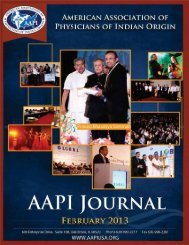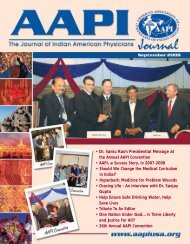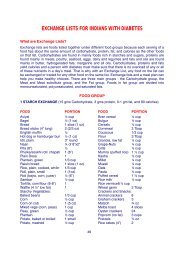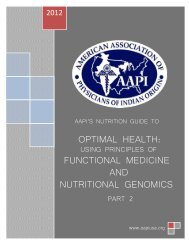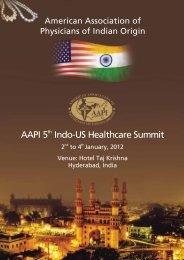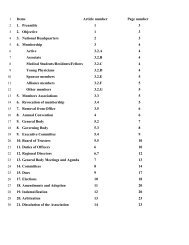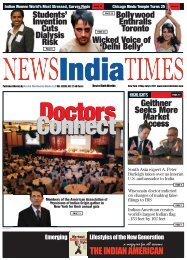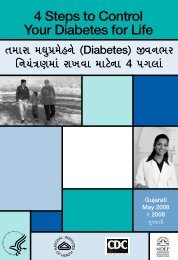Great Equalization: Is MBBS From India Equal To M.D. In U.S.A?
Great Equalization: Is MBBS From India Equal To M.D. In U.S.A?
Great Equalization: Is MBBS From India Equal To M.D. In U.S.A?
Create successful ePaper yourself
Turn your PDF publications into a flip-book with our unique Google optimized e-Paper software.
AAPI Journal • March 2009<br />
SPECIAL ARTICLE<br />
Probiotic Theraphy<br />
Continued from page 27<br />
disaccharide lactose into the<br />
simple sugars glucose and<br />
galactose in the Ileum, and thus<br />
reduce the discomfort of lactose<br />
intolerance.<br />
2. Reduction of intestinal<br />
infections: Antibiotic-induced<br />
diarrhea has been successfully<br />
controlled by Probiotics.<br />
Lactobacillus and<br />
Bifidobacterium have been used<br />
in children and adults for<br />
therapy of intestinal infections.<br />
3. Reduction of coronary heart<br />
disease: The fact that Probiotic<br />
supplementation inhibits<br />
cholesterol concentrations in the<br />
blood and increases the<br />
excretion of cholesterol in the<br />
feces has been well<br />
documented. Cholesterol<br />
absorption is interfered within<br />
the gut partly due to<br />
assimilation of cholesterol by<br />
Probiotic organisms. <strong>In</strong> addition,<br />
Probiotics (Bifidobacterium<br />
longum) deconjugate bile salts<br />
with the aid of bile salt<br />
hydrolase, and thus increase the<br />
excretion of free bile salts in the<br />
feces. This has the potential to<br />
reduce serum cholesterol<br />
because the replacement of bile<br />
salts would require the<br />
utilization of some cholesterol<br />
in the body. Thus, the resultant<br />
hypocholesterolemia may<br />
reduce the incidence of<br />
coronary heart disease.<br />
4. Immunomodulation: This is a<br />
very important activity induced<br />
by Probiotics. Immunestimulating<br />
activity is attributed<br />
to their bacterial cell envelope<br />
constituents such as<br />
peptidoglycan. Results of<br />
various investigators indicate<br />
that Probiotics stimulate the<br />
28 www.aapiusa.org<br />
production of antibodies,<br />
enhance the systemic activity of<br />
macrophages, and increase<br />
interferon levels and the number<br />
of killer cells.<br />
5. Suppression of cancer: Dietary<br />
intake of lyophilized cultures of<br />
Bifidobacterium longum has<br />
significantly suppressed the<br />
development of azoxymethaneinduced<br />
aberrant crypt foci<br />
(ACF) formation in the colon.<br />
The same group of scientists<br />
elucidated the ability of the<br />
Probiotic strain to inhibit the<br />
incidence of colon tumors.<br />
6. Suppression of Helicobacter<br />
pylori: Helicobacter pylori is a<br />
gram-negative spiral-shaped<br />
bacterial pathogen that<br />
colonizes in the area between<br />
the mucous layers of the<br />
stomach and gastric epithelium.<br />
The <strong>In</strong>ternational Agency for<br />
Research on Cancer has<br />
classified H. pylori as a Group I<br />
carcinogen. This is the first<br />
pathogenic bacterium to be<br />
classified as such. Limited<br />
research data indicate that even<br />
H. pylori can be inactivated or<br />
suppressed with the use of<br />
proper Probiotics.<br />
Prophylactic Probiotic Therapy for<br />
Cancer Suppression:<br />
Some of the non-Probiotic type of<br />
gastrointestinal flora will convert<br />
procarcinogens to carcinogens. Some<br />
of the end products of digestion are<br />
procarcinogenic. For example, end<br />
products of the digestion of beef may<br />
be more procarcinogenic than those<br />
of vegetables. Procarcinogenic<br />
materials may not cause cancer;<br />
however, if they are acted upon by<br />
certain microbial enzymes (betaglycosidase;<br />
beta-glucuronidase;<br />
steroid 7 alpha-dehydroxylase;<br />
nitroreductase and nitrate reductase;<br />
azoreductase; and tryptophanase) in<br />
the G.I. tract, it will be converted to<br />
a carcinogen. Probiotics, by their<br />
innate nature, suppress the growth of<br />
these undesirable enzyme-producing<br />
non-Probiotic bacteria, and thus<br />
reduce the chance of converting<br />
procarcinogens to carcinogens.<br />
If you analyze the entire<br />
mechanism, cancer starts with one<br />
cell through mutation. If mutagens<br />
are reduced or eliminated in the<br />
body, cancer can be controlled.<br />
Mutagens can be reduced if proper<br />
Probiotics are administered and<br />
made to colonize in the<br />
gastrointestinal tract. <strong>In</strong> our opinion,<br />
a proper diet and Probiotic therapy is<br />
the wave of the future to eliminate<br />
mutagenesis, which is the starting<br />
point of cancer.<br />
<strong>In</strong> conclusion:<br />
Since the efficacy of Probiotic<br />
therapy is linked to the proper<br />
Probiotic organisms and also their<br />
physiological condition at the time of<br />
oral administration, the following<br />
selection criteria should be followed<br />
by the physician:<br />
1. They must be of human origin.<br />
2. They must have high acid and<br />
bile stability.<br />
3. They must have adhesion<br />
properties to stick and colonize<br />
on the intestinal mucosa.<br />
4. They must be safe and clinically<br />
proven.<br />
5. They must be clinically<br />
validated.<br />
6. They must be produced or<br />
manufactured by taking into<br />
account the strain stability<br />
(plasmid retention), phage<br />
resistance and freeze drying<br />
survival.



